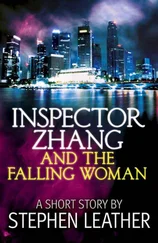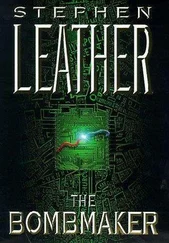Stephen Leather - The Long shot
Здесь есть возможность читать онлайн «Stephen Leather - The Long shot» весь текст электронной книги совершенно бесплатно (целиком полную версию без сокращений). В некоторых случаях можно слушать аудио, скачать через торрент в формате fb2 и присутствует краткое содержание. Жанр: Триллер, на английском языке. Описание произведения, (предисловие) а так же отзывы посетителей доступны на портале библиотеки ЛибКат.
- Название:The Long shot
- Автор:
- Жанр:
- Год:неизвестен
- ISBN:нет данных
- Рейтинг книги:5 / 5. Голосов: 1
-
Избранное:Добавить в избранное
- Отзывы:
-
Ваша оценка:
- 100
- 1
- 2
- 3
- 4
- 5
The Long shot: краткое содержание, описание и аннотация
Предлагаем к чтению аннотацию, описание, краткое содержание или предисловие (зависит от того, что написал сам автор книги «The Long shot»). Если вы не нашли необходимую информацию о книге — напишите в комментариях, мы постараемся отыскать её.
The Long shot — читать онлайн бесплатно полную книгу (весь текст) целиком
Ниже представлен текст книги, разбитый по страницам. Система сохранения места последней прочитанной страницы, позволяет с удобством читать онлайн бесплатно книгу «The Long shot», без необходимости каждый раз заново искать на чём Вы остановились. Поставьте закладку, и сможете в любой момент перейти на страницу, на которой закончили чтение.
Интервал:
Закладка:
Stephen Leather
The Long shot
The tyres of the Boeing 737 bit into the runway, squealing like dying pigs and sending spurts of dust into the air. The plane taxied towards the terminal building which shimmered in the midday heat. In the First Class cabin the passengers began to unbuckle their seat belts before the plane had come to a halt. A dark-haired stewardess left her seat and went over to the occupant of seat 3B. She bent down and gave him her professional smile. “Mr Ahmed?” she said. The man continued reading as if he hadn’t heard. “Mr Ahmed?” she repeated. He looked up and nodded. He was a typical First Class passenger: middle-aged, overweight and seemingly bored with the whole business of flying. He’d scarcely touched the inflight food and rejected the complimentary headset with an impatient wave of his hand. He’d spent most of the three-hour flight with his nose buried in the Wall Street Journal. “Mr Ahmed, the pilot has requested that you remain behind while the rest of the passengers deplane,” she said.
The passenger didn’t seem the least bit surprised by the request. “What about the people I’m travelling with?” he asked. The woman next to him was down on the manifest as his wife and, like the man, was travelling on a Yemeni diplomatic passport. A grey-haired older woman, apparently his mother, was sitting behind him, and on the other side of the cabin were his two young children. All had Yemeni diplomatic passports.
“I’m sorry, sir, they’re also to stay behind.”
The passenger nodded. “I understand,” he said quietly. “Will you tell my children while I explain to my mother?”
The stewardess went over to explain to the youngsters while Ahmed turned around and spoke to the old woman. Elba Maria Sanchez had grown accustomed to waiting in airliners while immigration officials took advice on whether or not her son should be admitted into their country. The family had been turned away from most of the countries in the Middle East, and previous safe havens including East Germany and Hungary had turned their backs on their old cohorts in their rush to embrace capitalism. Even the Sudanese had betrayed them.
The passengers shuffled off the plane. The stewardess asked Ahmed if he wanted a drink while he waited but he declined. He picked up a copy of Newsweek and idly flicked through it. “It’s always the same,” said his wife bitterly. “They should be ashamed of themselves, these people, they have no loyalty. After all we’ve done for them.”
“Be patient, Magdalena,” said the man, his eyes on the magazine.
“Patient! Ha! I was patient in Tripoli, I was patient in Damascus, I’ve been patient in virtually every airport in the Middle East. Face it, Ilich, no-one wants us any more. We’re an embarrassment.”
“Hush,” he said quietly. “You’ll upset the children.”
She looked like she was about to argue but before she could speak a small, unimposing man in a dark suit appeared at the doorway. He carried a shiny black briefcase and he nervously rubbed his moustache as he approached Ahmed. He introduced himself as Khatami, just the one name, and he didn’t tell the passenger who he represented. There was no need. He suggested that they go back into the Business Class cabin where they could have some privacy and Ahmed followed him along the aisle. Ahmed’s children looked anxiously up at him and he winked at them reassuringly. Khatami stood to the side to allow Ahmed past and then he whisked the blue curtain closed. Ahmed sat down in an aisle seat and Khatami took the seat opposite him, balancing the briefcase on his knees. Khatami seemed uneasy and beads of perspiration dripped down either side of his beakish nose. “Your passport, please,” he said, holding out his hand.
Ahmed took his passport from the inside pocket of his Armani jacket and handed it over. Khatami flicked through the pages of the passport which contained a plethora of visas and immigration stamps. He read the name at the front of the passport: Nagi Abubaker Ahmed. The photograph matched the man sitting in front of him: a receding hairline, a thick moustache over fleshy lips, and jowls around the chin that suggested the man had lived a soft life with too much time spent in expensive restaurants. “You are Ilich Ramirez Sanchez?”
The passenger nodded.
“The woman travelling with you is Magdalena Kopp?”
Another curt nod.
“Mr Sanchez, I’ve been asked to put a number of questions to you before our Government decides whether or not it can accommodate your request for asylum.” Sanchez said nothing. Khatami could see his own reflection in the darkened lenses of Sanchez’s spectacles. It gave him an uneasy feeling and he took a large white handkerchief from his pocket and wiped his forehead. “You have been living in Damascus for some time, is that correct?”
“Yes,” said Sanchez.
“From there you went where?”
“To Libya.”
“The Libyans would not allow you to stay in their country?”
“You are well informed,” said Sanchez.
“And from Libya you went back to Damascus?”
“That was the first plane out of the country, yes.”
Khatami nodded, wiped his forehead again and shoved the handkerchief back into his top pocket. “Your assets are where?”
“Assets? I don’t understand.”
“You have money?”
Sanchez smiled. “Yes, I have money. I was well paid for my work.”
“The money is where?”
“Switzerland, mainly. I also have one million dollars in my diplomatic baggage. I can assure you I will not be a burden.”
Khatami smiled nervously. “Good, good. That’s good.” He looked down at his briefcase and noticed that he was gripping it so tightly that his nails were biting into the leather. He took his hands away and Sanchez saw two wet palm prints where they had been. “My Government is particularly concerned about your past, Mr Sanchez. Your, how shall I call them?. . exploits. . have been well documented, and have attracted a great deal of publicity. They want to know whether or not you have rescinded your terrorist past.”
Sanchez sighed. “I am looking only for a place where my family and I can live in safety. My past is my past.”
Khatami nodded, keeping his eyes down so that he wouldn’t have to look at his own reflection. “Then you no longer consider yourself a terrorist?”
“That is correct,” said Sanchez.
“Ah,” said Khatami. “That is a great pity. A great pity.” He lifted his head and there was a look of hawkish intensity in his eyes. “It could well be in the future that we would have need of someone with your talents.”
“I see,” said Sanchez. He took off his spectacles, revealing brown eyes that were surprisingly soft and amused. “I would not have a problem with that. I think that whoever offers me sanctuary would have the right to expect me to perform a service for them.”
Khatami grinned and nodded. He had expected the discussion with Ilich Ramirez Sanchez to be much more stressful. The man the world knew as Carlos the Jackal was proving surprisingly easy to deal with.
Jim Mitchell scanned the clear blue skies through the cockpit of his Cessna 172. It was a glorious day for flying. There were a few wisps of feathery clouds but they were way up high, much higher than the single-engine Cessna could ever hope to fly. To the north-west, about eight miles away, he saw the runway, almost perpendicular to the nose of the Cessna. The plane was perfectly trimmed and there was next to no turbulence so he needed only the barest pressure on the wheel to maintain his course. He turned his head to the right and caught his wife’s eye. She smiled and winked at him and he grinned back. “Sandra, do you want to call them?”
Читать дальшеИнтервал:
Закладка:
Похожие книги на «The Long shot»
Представляем Вашему вниманию похожие книги на «The Long shot» списком для выбора. Мы отобрали схожую по названию и смыслу литературу в надежде предоставить читателям больше вариантов отыскать новые, интересные, ещё непрочитанные произведения.
Обсуждение, отзывы о книге «The Long shot» и просто собственные мнения читателей. Оставьте ваши комментарии, напишите, что Вы думаете о произведении, его смысле или главных героях. Укажите что конкретно понравилось, а что нет, и почему Вы так считаете.










